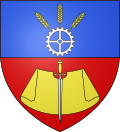Cléon
Appearance
Cléon | |
|---|---|
| Country | France |
| Region | Normandy |
| Department | Seine-Maritime |
| Arrondissement | Rouen |
| Canton | Caudebec-lès-Elbeuf |
| Intercommunality | CREA |
| Government | |
| • Mayor | Alain Ovide |
Area 1 | 6.47 km2 (2.50 sq mi) |
| Population (2006) | 5,824 |
| • Density | 900/km2 (2,300/sq mi) |
| Time zone | UTC+01:00 (CET) |
| • Summer (DST) | UTC+02:00 (CEST) |
| INSEE/Postal code | 76178 /76410 |
| Elevation | 2–37 m (6.6–121.4 ft) (avg. 10 m or 33 ft) |
| 1 French Land Register data, which excludes lakes, ponds, glaciers > 1 km2 (0.386 sq mi or 247 acres) and river estuaries. | |
Cléon is a commune in the Seine-Maritime department in the Normandy region in northern France.
This city is known for its Renault factory, which manufactures engines and gearboxes.
The name of the city will be used to name two engines iconic car brand Renault, the mythical "Cléon-Fonte engine" and "Cléon-Alu Engine". For collectors of vintage cars, the name "Cléon" refers primarily to these two engines that drive their vehicles collections.
Geography
A small town situated inside a meander of the river Seine some 11 miles (18 km) south of Rouen, at the junction of the D7 and the D144 roads. The French car manufacturer Renault has its principal engine and gearbox factory within the commune’s territory, covering an area of 135 hectares (330 acres).
Heraldry
 |
The arms of Cléon are blazoned : Per fess 1: Azure, 3 stalks of wheat Or issuant from a toothed wheel argent; 2: Gules, a sword inverted argent hilted Or, over a mantle displayed Or.
|
Population
| Year | 1962 | 1968 | 1975 | 1982 | 1990 | 1999 | 2006 |
|---|---|---|---|---|---|---|---|
| Population | 1336 | 1938 | 3157 | 5089 | 5870 | 6042 | 5824 |
| From the year 1962 on: No double counting—residents of multiple communes (e.g. students and military personnel) are counted only once. | |||||||
Places of interest
- The church of St.Martin, dating from the sixteenth century.
- A seventeenth century manorhouse.
See also
References
External links
Wikimedia Commons has media related to Cléon (Seine-Maritime).


